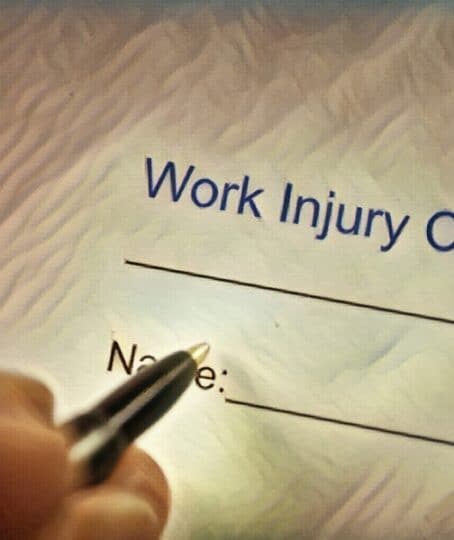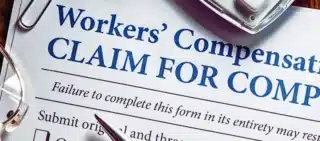
Common Reasons an Employer Won't Report Your Work Injury A total of 101,400 non-fatal work-related injuries and illnesses occurred in...


After an on-the-job injury, knowing what not to say to a Bloomington workers’ comp claims adjuster can be just as important as knowing what to say. If you have been injured at work and are seeking compensation, you will likely have to speak to a workers’ comp claims adjuster. He or she may discuss with you the circumstances of your accident, specifics relating to your injury, and details regarding your progress.
In general, it is best to avoid making any type of recorded statement until you have talked to an Illinois workers’ compensation lawyer.

A workers' compensation claims adjuster is the person assigned to your workers’ compensation case that is responsible for evaluating your claim, negotiating a settlement, and resolving your workers' compensation claim. The adjuster will likely investigate your claim to determine the validity of the injury and the extent of the employer's liability. The adjuster will also negotiate with employees and medical providers to reach a fair settlement, and approve or deny payment of benefits to the injured worker.
The goal of a workers' compensation claims adjuster is to resolve claims efficiently and fairly, while also protecting the financial interests of the employer. A Bloomington workers’ comp attorney can help you understand what workers' compensation investigations look for.
When you speak to a claims adjuster, be mindful of what you say, as some statements may harm your case. Some things you should not say to a workers' comp claims adjuster in Bloomington include:
Exaggerating your injuries to the claims adjuster may result in the denial of your claim. The adjuster will thoroughly investigate the claim and if he or she determines that you have exaggerated your injuries, your claim may be denied based on misrepresentation of your injuries or other such reasons.
Avoid making any statements that could be interpreted as an admission of fault or guilt, even if you believe you were partially responsible. Admitting fault may result in the denial of your claim. The claims adjuster may use your admission of fault to prove that you are responsible for your own injuries.
Do not minimize the extent of your injury or the impact it has had on your life.
Do not sign any documents or agreements without first seeking legal advice from an attorney experienced in workers’ compensation.
While there are several things you will need to avoid saying to a workers’ comp claims adjuster, you may also wonder what things you should say. Prior to speaking with a claims adjuster, it is a good idea to get advice from an experienced workers’ comp attorney in Bloomington to review what you plan to say.
It is important to remain professional and courteous in your interactions with the adjuster, even if you disagree with his or her decisions or actions. You should provide clear and accurate information to the claims adjuster. Be honest and accurate when answering the adjuster's questions, providing information, and filling out forms. You should explain the nature and extent of your injuries and how they affect your ability to perform your job duties. If you don't understand something the adjuster is asking or saying, don't hesitate to ask for clarification.
Keep a record of all of your interactions with the claims adjuster. This record should include dates, times, and the topics discussed. If you are unsure about the process, your rights, or the status of your claim, consider seeking legal advice from an attorney experienced in workers' compensation cases.
Workers' compensation, also known as workers' comp, is a type of insurance that provides financial benefits and medical treatment to employees who have suffered work-related injuries or illnesses. Workers’ comp protects employees by providing them with support and compensation in case of a workplace injury or illness.
The amount of compensation that an employee is eligible for depends on the severity of the injury or illness and can include coverage for medical expenses, rehabilitation, and lost wages. In some cases, workers' compensation may also provide death benefits to the families of employees who die as a result of work-related incidents.
One of the key advantages of workers' compensation is that it provides a quick and efficient way for employees to receive benefits in the event of a workplace injury or illness. Rather than having to go through the lengthy and often complicated process of filing a lawsuit, employees can simply file a claim with their employer's workers' compensation insurance provider. This can be especially important for employees who need immediate access to medical care and financial support.
Another important benefit of workers' compensation is that it provides employees with a sense of security and peace of mind. Knowing that they have support and financial assistance in case of a workplace injury or illness can help employees feel more confident and secure in their jobs. This can lead to increased job satisfaction and a more productive workforce.
If you have been injured on the job in Illinois, there are several steps you will want to take. These steps include:
Workers' compensation insurance is a type of insurance that provides benefits to employees who are injured on the job. There are four main types of worker’s compensation to which you may be entitled. An Illinois Workers’ compensation lawyer can help you understand what type of compensation you are likely to receive, depending on your unique situation. The four main types of worker’s compensation benefits are:
Workers' compensation medical benefits are a type of benefit provided to employees who are injured on the job that covers the cost of medical treatment related to the work-related injury. These benefits cover the cost of doctor visits, hospital stays, medication, surgery, and other forms of medical care.
If your injury requires long-term care, such as physical therapy, this should also be covered by workers’ compensation. Workers' compensation medical benefits are usually provided without a limit on the amount that can be claimed, meaning that the employee can receive all the medical treatment he or she needs to fully recover from his or her injury.
Workers' compensation lost wage benefits are payments made to an employee who has been injured on the job and is unable to work. These benefits are intended to replace a portion of the wages the worker would have earned if not for the injury, and are typically paid as a weekly or bi-weekly income, with the amount depending on state laws and the worker's income before the injury. The goal of lost wage benefits is to help the injured worker financially while they recover from their injury and return to work.
The amount of compensation you can receive for lost wages is calculated based on the extent of your injury and your average weekly wages prior to being injured. The Social Security Administration classifies work-related injuries into four different categories. These categories are:
Vocational rehabilitation benefits are benefits provided to injured workers to help them return to work after a job-related injury or illness. These benefits are intended to provide support and resources to help the worker recover from his or her injury and either return to his or her previous job or find new employment if necessary.
Examples of vocational rehabilitation benefits can include job training, job placement services, education and skill development, and rehabilitation services such as physical therapy. The goal is to help the worker regain their earning capacity and become self-sufficient again.
Workers' compensation death benefits are payments made to the surviving family members of a worker who died as a result of a job-related injury or illness. These benefits are intended to provide financial support to the surviving family members and help them through the difficult period following the worker's death. In Illinois, a beneficiary is entitled to 66% of the worker’s average weekly wages during the 52 weeks prior to the worker's death. These benefits are paid for up to 25 years or up to $500,000. Beneficiaries may also receive compensation for funeral and burial expenses for the deceased worker.
There are several other things you should do while your workers’ compensation claim is pending. First, you should make sure that you follow your doctor’s orders and attend all of your medical appointments. If you have been given medical treatment, it is important to follow your doctor's orders. Failure to follow doctor's orders may result in the denial of your claim. The claims adjuster may argue that if you were truly injured, you would have followed your doctor's orders.
You will need to avoid discussing the details of your injury with others, as this information could be used against you. The claims adjuster may try to use the information against you to prove that you were not as injured as you claim to be. It is best to keep the details of your injury to yourself or your doctor.
You should also avoid posting about your injury or your claim on social media. This information could also be used against you. The claims adjuster may use your posts to prove that you are not as injured as you claim to be. Additionally, avoid posting pictures or videos of yourself engaging in activities that you claim to be unable to perform due to your injury.
By following these guidelines, you can ensure that your workers' compensation claim is handled smoothly, and you receive the benefits you are entitled to.
If your workers’ comp claim is disputed, you may be required to attend a hearing before an arbitrator. The arbitrator will consider the evidence and make a decision on the claim. If you disagree with the decision of the arbitrator, you have the right to appeal the decision to the Illinois Workers' Compensation Commission. There are many reasons that a claim to be denied, such as:
If your workers’ comp claim is denied, you may want to consult an Illinois workers’ comp lawyer, who can not only explain what not to say to a workers' comp claims adjuster but also help you appeal the decision and get the benefits you need.

Common Reasons an Employer Won't Report Your Work Injury A total of 101,400 non-fatal work-related injuries and illnesses occurred in...

At Strong Law Offices, we have a team of workers' compensation lawyers who understand the financial setbacks and physical limitations...

Common Equipment Involved in Run-Over Accidents Illinois job sites, from construction zones to industrial plants, depend on machinery to stay...